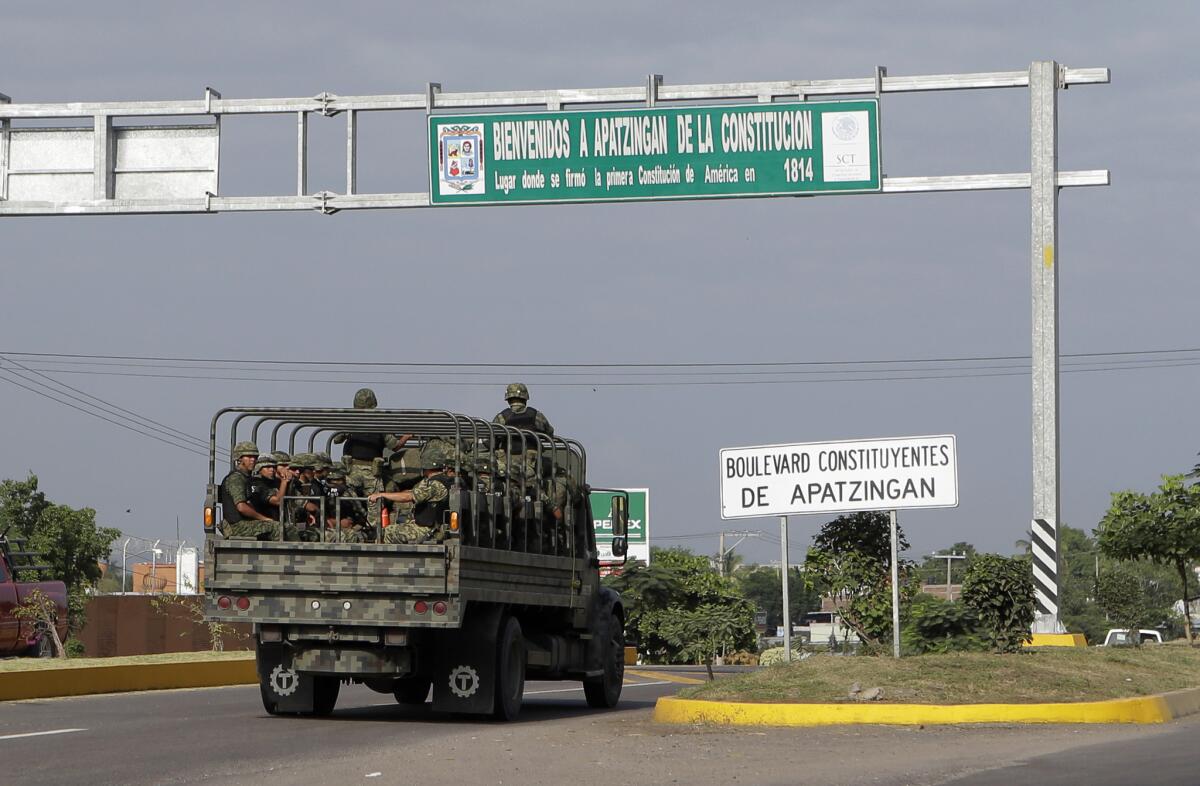Defiant Mexican bishop denounces drug gangs, government

- Share via
MEXICO CITY -- In a rare public airing, a senior Catholic prelate has denounced control of Mexico’s Michoacan state by violent drug traffickers, challenging official government claims and igniting a fierce debate.
Miguel Patiño, the bishop of Apatzingan, one of Michoacan’s largest cities and a headquarters for the state’s main criminal network, made his charges in an open letter and then in a series of interviews.
He said Michoacan had essentially become a failed state because authorities are afraid of -- or in collusion with -- organized crime figures. The state has long been dominated by a gang calling itself the Knights Templar, and its forerunner, La Familia, groups that specialized in producing methamphetamine for the U.S. market. They have branched out into rampant extortion schemes, kidnapping and other illicit activities.
More coverage: Mexico Under Siege
In Michoacan, an “absence of law and justice” prevails, Patiño wrote, “provoking insecurity, fear, sadness, anger, mistrust, rivalries, indifference, death and oppression.”
The assorted drug cartels, he said, naming them by name, fight over Michoacan as if it were “spoils for the plunder.” Waves of murder, kidnappings, threats and extortion have swelled in recent months, he said, forcing entire families to flee the state out of fear.
His comments were remarkable both because they came from a senior official in the Roman Catholic Church, which more often than not has remained silent about drug cartels, and because they fly in the face of more sanguine statements from the government.
As the bishop was describing a bleak climate of fear, for example, federal Atty. Gen. Jesus Murillo Karam pronounced that the government had “rescued” Michoacan. (Two days later, the government announced it had to send army troops into the state’s port, Lazaro Cardenas, one of Mexico’s largest and busiest, to attempt to rein in the criminals.)
Although bigger and more powerful drug cartels exist elsewhere in Mexico, Michoacan seems to stand alone as a place where the bad guys have singularly sought to take over political as well as law enforcement power.
And it is a state that has repeatedly defied efforts to restore legitimate authority. The inability of the current administration of President Enrique Peña Nieto, as well as that of his predecessor, Felipe Calderon, to tame Michoacan has raised questions about the governability of important parts of the nation. Both presidents made Michoacan a priority, but the reigning cartel has only grown stronger.
The bishop released his letter last month, and at Mass last Sunday called on parishioners to overcome their terror and honor relatives who have been killed in the violence. He has reportedly received death threats for his outspokenness.
This week, Patiño was at a previously scheduled spiritual retreat elsewhere in Michoacan, church officials said. When a police contingent showed up to escort him to the retreat, rumors flew that he had been picked up by an “armed commando.”
A reinforced army presence has calmed the atmosphere a bit and eased the ability of residents to move about, the Rev. Javier Cortes Ochoa, vicar general of the church in Apatzingan, said in an interview. But tensions remain high, he said, adding that armed youths working for the criminal gangs were the ones controlling the city’s entry points -- not federal forces.
“They are keeping the people from the self-defense groups out,” Cortes said. “They ask for an ID card, and if the person is from a town where there are self-defense squads, he doesn’t come into Apatzingan.”
In a series of newspaper and radio interviews after he made his letter public, Patiño described the way in which the Knights Templar control everything from transit on roads to who can sell gasoline and tortillas.
“The municipal government and the police are subjugated by, or in cahoots with, the criminals, and the rumor grows steadily that the state government is also at the service of organized crime,” Patiño said. “This provokes desperation and disillusion in our society.”
ALSO:
Bombing in heart of Syria’s capital kills 8
Egypt court upholds ban on Muslim Brotherhood
Britain to stop building warships in England, keep Scotland shipyard
More to Read
Sign up for Essential California
The most important California stories and recommendations in your inbox every morning.
You may occasionally receive promotional content from the Los Angeles Times.











